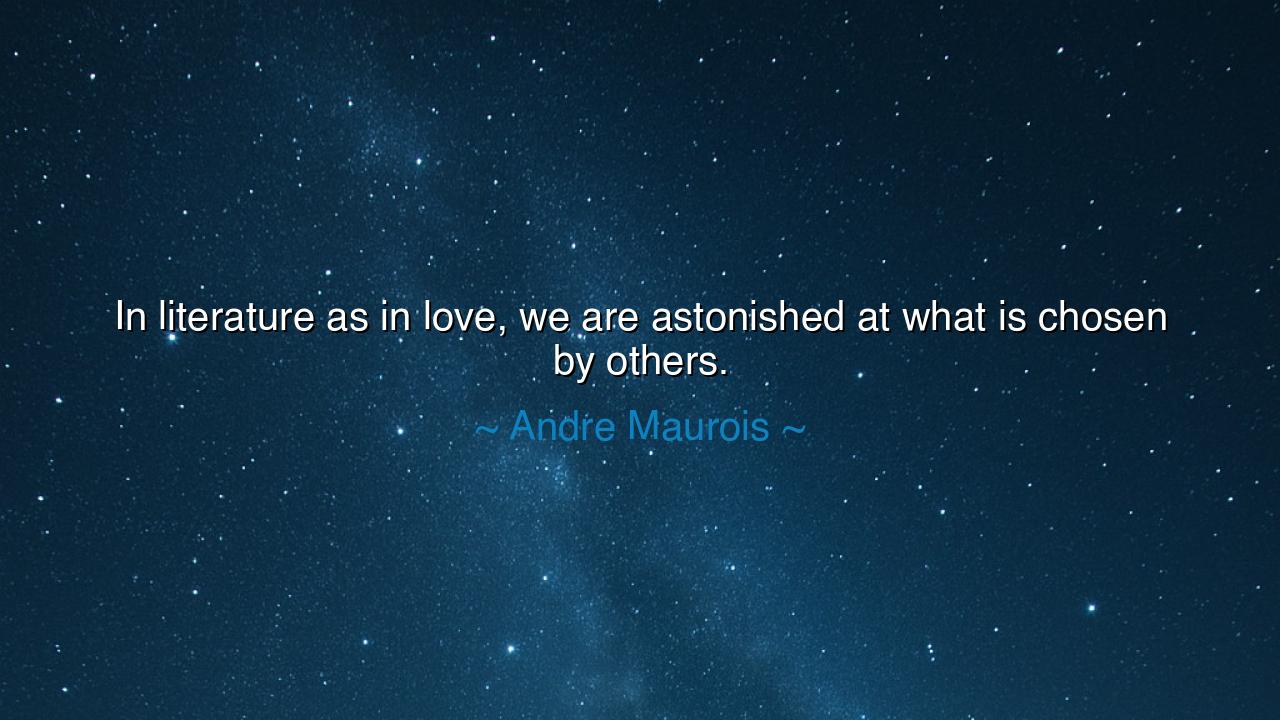
In literature as in love, we are astonished at what is chosen by






The French writer André Maurois once said: “In literature as in love, we are astonished at what is chosen by others.” In these few words lies a truth both tender and profound — a mirror held up to the mysteries of taste, desire, and the human heart. What one soul adores, another may pass by in silence. What moves one person to tears may leave another unmoved. Such is the wonder and paradox of both art and love: that they belong to the realm of the soul, where logic bows before emotion and beauty wears a thousand faces.
From the beginning of time, men and women have tried to define beauty — in words, in art, in the hearts of their beloved — yet it has always eluded them. The poet may praise the moonlight, the philosopher may praise virtue, but the heart loves where it will, unbound by reason or rule. So too in literature, where one reader finds ecstasy, another finds nothing but ink and paper. Maurois saw in this the same divine mystery that governs human affection: that each spirit is drawn by a different flame, and the light that burns for one may seem dim to another.
In ancient Greece, there was a tale of two sculptors, Pygmalion and Lysander, who each carved from stone the image of their ideal woman. Pygmalion shaped his statue with delicate grace and perfect proportion, and the gods, pitying his longing, brought it to life as Galatea, the image of classical beauty. But Lysander, whose hands trembled not with skill but with passion, carved a face that was rough, imperfect, yet full of soul. When he revealed his work, the people laughed — but one woman in the crowd, moved by something deeper than beauty, took his hand and said, “You have carved the truth of the heart.” From that day forward, Lysander’s imperfect statue was forgotten, but his love endured. So it is with art and love — that what touches one soul may astonish another, not for its ugliness, but for its unfamiliar beauty.
The astonishment Maurois speaks of is not one of judgment, but of wonder — the quiet realization that every soul walks its own path to joy. The lover who chooses another we cannot understand is like the reader who adores a book we could not finish; in both, there is a sacred mystery that reminds us that the world is not built in our image. To love, then, is to accept difference; to read with wisdom is to marvel at the diversity of the human heart. Those who cannot do so live in a narrow house, forever puzzled that others find warmth in windows they have never opened.
The origin of Maurois’s insight lies in his own life. A man of letters, philosopher, and lover of art, he witnessed the infinite diversity of human affection — in literature, in friendship, in romance. He saw that no two readers, like no two lovers, ever see the same person or story the same way. For what we love in others, or in books, is a reflection of our own inner world. The gentle love tenderness; the passionate love fire; the wounded love understanding. Each choice reveals the hidden geography of the heart.
There is a deep humility in this truth. When we are astonished by what others love, it is an opportunity not for scorn but for understanding. It invites us to ask, “What beauty do they see that I do not?” The wise know that the diversity of taste is not a sign of confusion, but of richness. If every soul loved the same story, or the same person, the world would grow gray and dull. It is the variety of loves and visions that makes life magnificent — a vast tapestry woven of countless colors, none superior, all essential.
So let this be the lesson: do not mock what another cherishes, whether it is a poem, a song, or a soul. For in that choice lies their truth, the map of their experience and their longing. If you wish to grow wise, learn to look with curiosity instead of comparison. Read the books that others love — not to agree, but to understand. Listen to why another heart beats faster for what seems ordinary to you. In doing so, your own world expands, and the narrow walls of your understanding crumble into light.
Thus, as André Maurois reminds us, both literature and love are mirrors — and every heart reflects a different image. What astonishes us in others is the reminder that beauty is not one, but infinite. To walk among these infinities with wonder instead of judgment is to live as the ancients did: in reverence for the mysterious harmony of human souls. And when we learn to celebrate that mystery, we too become part of the eternal story — the one written not in ink, but in love itself.






AAdministratorAdministrator
Welcome, honored guests. Please leave a comment, we will respond soon